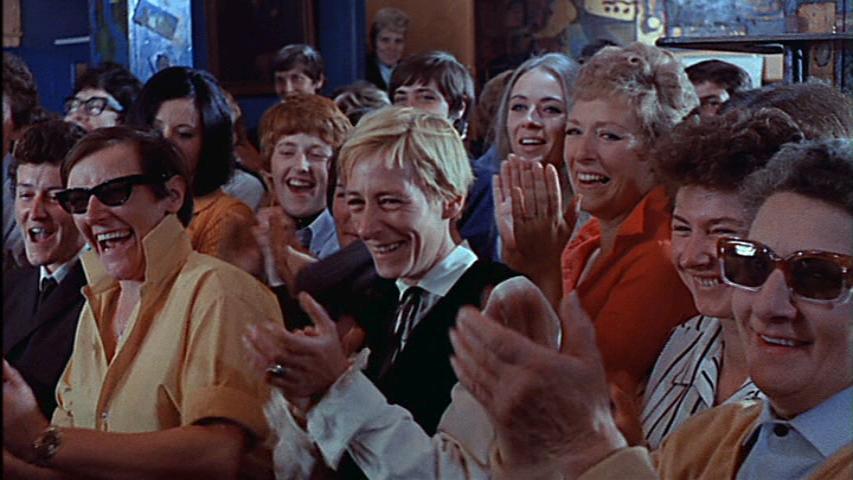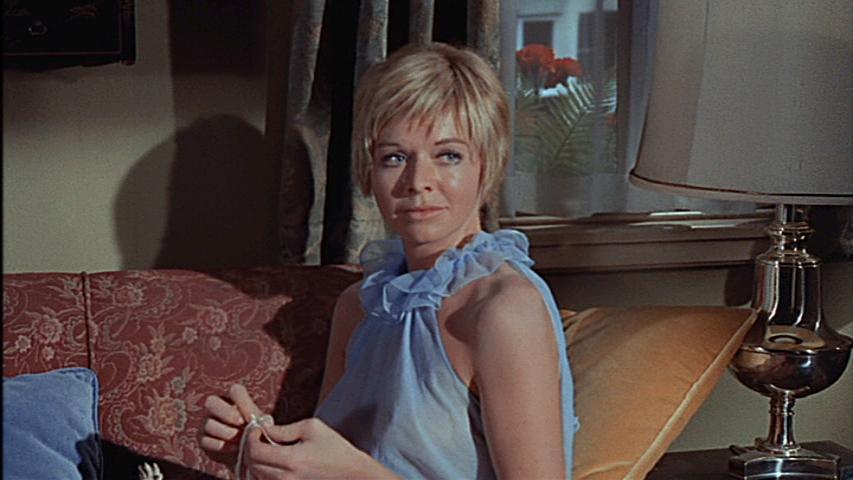|
Genres, Themes, Actors, and Directors:
- Actors and Actresses
- Black Comedy
- Has-Beens
- Lesbianism
- Play Adaptations
- Robert Aldrich Films
- Susannah York Films
Review:
Robert Aldrich’s smart, well-acted adaptation of Frank Marcus’s satirical play received a notorious “X” rating when it was released (though this was reduced to an “R” just a few years later). Indeed, it’s easy to see why unsuspecting audiences may have been shocked, given the movie’s overt treatment of female homosexuality. Although the word “lesbian” isn’t uttered until two hours into the film, there’s no mistaking what kind of relationship these women have with each other; and for those who might still be unclear, the scene in a lesbian club makes it unambiguous.

Sensationalism aside, however, Sister George remains a surprisingly humorous tale of grandiosity and insecurity in show biz; we don’t always like or admire George’s actions, but we can’t help feeling compassion for her predicament. Perhaps the best aspect of the movie, however, is the relationship between George and her young lover “Childie”, played by Susannah York.

York’s performance is raw and daring — she puts herself all the way out on the line here, and it pays off tremendously.
Redeeming Qualities and Moments:
Must See?
Yes. This controversial movie may not be for all tastes, but I believe it’s must-see viewing for film fanatics.
Categories
- Controversial Film
- Noteworthy Performance(s)
Links:
|
One thought on “Killing of Sister George, The (1968)”
A must, but not because it’s great. Not as controversial as when first released, it remains bizarre enough (esp. toward its conclusion) that film fanatics will want to know it for the singular oddity that it is. One might wonder how such an anomaly (originally intended as a comedy!) got as far as it did (from stage to film), except when we recall that it emerged from a period in which a number of films depicted the lives of gay people as something to be pitied or censured (‘The Boys in the Band’, ‘Staircase’, ‘The Fox’, ‘The Sergeant’, etc.). It also owes much to ‘Who’s Afraid of Virginia Woolf? – not only in style, but is it a coincidence that the lead is named George and there’s a murky unraveling in the plot involving a child?
This is one of four mid-career films by director Aldrich in which the focus is on wacky women — probably right behind ‘What Ever Happened to Baby Jane?’, with ‘The Legend of Lylah Clare’ and ‘Hush…Hush, Sweet Charlotte’ having less appeal. Aldrich’s foray into the land of loony ladies began, I think, with the vaguely lesbian character Gaby Rodgers played in ‘Kiss Me Deadly’. But it seems Anouk Aimee’s Queen of Sodom in Aldrich’s ‘Sodom and Gomorrah’ pushed him over into concrete concentration, and he balanced his strange, female-centric films with equally blunt macho movies.
‘Killing…’ sits at a tedious level when we watch the silly arguments between the two main characters. Although Reid and York are quite good, we have no sympathy for them when they’re alone. When Reid is shown in the tv realm, her performance is much more interesting, even if she is still pathetic. The real surprise here is Coral Browne’s work as the mysterious and, in spite of herself, cunning Mercy Croft. Since we know less about her, the development of her character remains intriguing.
Oddly enough, camp value here rests with the many scenes from the insipid soap opera in which Reid stars.